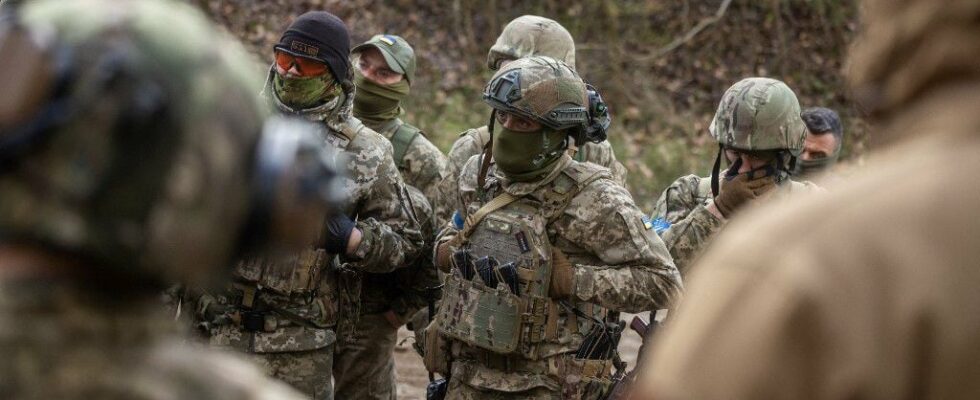“French, do not repeat the mistakes of your ancestors, their fate is known.” The message, written on posters put up on June 4 near the French embassy in Moscow, has the merit of being clear. And illustrates the growing pressure from the Kremlin against a possible sending of French military instructors to Ukraine – even if no decision has yet been officially announced by Paris. Barely three days earlier, five coffins covered with a French flag had already been placed near the Eiffel Tower with the words “French soldier from Ukraine”…
Nearly four months after the announcement by Emmanuel Macron, on February 26, that the deployment of Western troops in Ukraine should not be excluded, the hypothesis of seeing French soldiers officially set foot on Ukrainian soil has never been also appeared consistent. Everything accelerated at the end of May when the commander-in-chief of the Ukrainian army, Oleksandr Syrsky, affirmed that France would “soon” send instructors, before kyiv backpedaled the next day, specifying that the question was “still in discussion” with Paris and other countries.
“Gain efficiency and flexibility”
Since then, speculation has continued to grow. Will Emmanuel Macron make an announcement on the occasion of Volodymyr Zelensky’s visit to France for the 80th anniversary of the Normandy Landings, on June 6? For now, a meeting between the two heads of state at the Elysée the day after the commemorations has been announced by the French presidency, to discuss “the needs of Ukraine”, in the “extension of the Support Conference to Ukraine which was held at the Elysée on February 26”.
For Ukrainian forces in difficulty on the ground after months of facing a shortage of ammunition, and faced with a lack of human resources, such a decision would not be trivial. “Training Ukrainian fighters in their country would make it possible to gain in efficiency and flexibility, summarizes General Dominique Trinquand, military expert and former head of the French mission to the UN. This would save a lot of time compared to the transfers of Ukrainian soldiers in different European countries such as Germany, the United Kingdom or Poland.”
At this stage, around 52,000 Ukrainian soldiers have been trained in 24 countries as part of the EU Military Assistance Mission to Ukraine (EUMAM), including more than 10,000 in France. “Beyond saving time, training directly in Ukraine would help instructors adapt their training to the real conditions of combat on Ukrainian soil, underlines Ivan Klyszcz, researcher at the International Center for Defense and Security (ICDS) in Tallinn, in Estonia. This would also allow them to better integrate feedback from the field.”
Other countries have opened the door to such a shift in their military support. Lithuania “could also train soldiers in Ukraine in partnership with countries that are willing to do so,” Lithuanian Prime Minister Ingrida Šimonytė said at the end of May in an interview with Bloomberg. A few days earlier, Estonian Prime Minister Kaja Kallas had stated in the Financial Timesthat the training of soldiers in Ukraine by Western forces would not constitute an escalation of the conflict.
Give credibility to the commitment to Ukraine
Beyond just military questions, the deployment of European instructors in Ukraine would constitute a strong signal sent to Moscow. “The political stakes of such a decision seem to me to be much more important than the military,” confirms Pierre Haroche, lecturer in international relations and international security at Queen Mary University of London. “This would lend credibility to the idea of a commitment Western leadership in the long term, by showing that we are prepared to take risks for the defense of Ukraine.”
Within the Twenty-Seven, the European coalition of instructors project pushed by France, however, continues to divide. There is for the moment “no consensus”, summarized the head of European diplomacy Josep Borrell on May 28, while recognizing that “things are changing”. In Berlin, German diplomacy has so far given no sign of inflection following the refusal to accept it by Chancellor Olaf Scholz at the end of February. Same story in Warsaw. “Poland has considered the Ukrainian request regarding training, but we have come to the conclusion that it will be safer and more effective to train Ukrainian units in Poland,” Polish Foreign Minister Radoslaw said. Sikorski, May 31.
In the absence of European unanimity, it remains to find the right format. “An ad hoc coalition bringing together countries ready to take the plunge is a possible solution, points out Ivan Klyszcz, of the ICDS. France could play a leadership role, to the extent that it has opened the discussion on this subject. ” Pending a possible announcement from Paris, Russian officials have already increased their threats. “No instructor involved in the training of Ukrainian soldiers has immunity” from the strikes, Kremlin spokesperson Dmitri Peskov declared on June 4, while the head of Russian diplomacy Sergei Lavrov said the same day that they would constitute “a completely legitimate target”. A scenario in which the question of the French response would inevitably arise.
.
